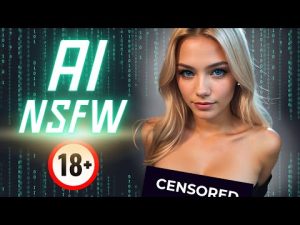In recent years, the emergence of AI technology has brought about significant advancements in various fields, including content generation and manipulation. One such technology is the AI NSFW (Not Safe for Work) Generator, which uses artificial intelligence algorithms to create or alter explicit and sensitive content. While this technology may have its merits, it also raises important legal concerns that need to be addressed.
Introduction to AI NSFW Generator
An AI NSFW Generator is a sophisticated application that utilizes deep learning algorithms to produce or modify images, videos, or text with explicit, adult, or sensitive content. It can generate explicit content from seemingly innocent inputs, which has raised eyebrows in both the technology and legal communities.
Key Features and Capabilities
- Power and Efficiency: AI NSFW Generators have shown remarkable power and efficiency in creating NSFW content rapidly, often outperforming human capabilities.
- Costs and Budget: The cost of using such technology can vary, but it may require a substantial budget for development, deployment, and maintenance.
- Quality and Speed: These generators can produce high-quality NSFW content swiftly, which can be concerning from a legal standpoint.
Legal Implications
When it comes to using AI NSFW Generators, there are several legal implications that users and developers should be aware of.
1. Privacy and Consent
AI NSFW Generators can potentially infringe on individuals' privacy rights. Unauthorized generation or distribution of explicit content featuring identifiable individuals can lead to privacy lawsuits, especially if the subjects did not provide consent.
2. Copyright Infringement
Generating or modifying copyrighted material without permission using AI NSFW Generators can result in copyright infringement claims. Developers and users should be cautious about using copyrighted materials as inputs.
3. Obscenity Laws
The creation and distribution of explicit content may violate obscenity laws in various jurisdictions. What may be considered obscene varies widely from place to place, making it essential to comply with local laws and regulations.
4. Child Pornography Laws
Generating explicit content featuring minors, even if digitally altered, can lead to severe legal consequences. Many countries have strict laws against child pornography, and using AI NSFW Generators for such purposes can result in criminal charges.
5. Revenge Porn and Harassment
AI NSFW Generators can be misused for revenge porn or harassment, which are illegal activities in many jurisdictions. Perpetrators may face criminal charges and civil lawsuits for such actions.

6. Ethical Concerns
Even if not explicitly illegal, using AI NSFW Generators for unethical purposes can damage a person's reputation and lead to social and professional consequences. It is important to consider the ethical implications of content creation and distribution.
7. Liability
Developers and providers of AI NSFW Generator software may be held liable for any illegal or harmful use of their technology. Implementing safeguards and responsible usage policies is crucial to mitigate liability risks.
Conclusion
The use of AI NSFW Generators has brought forth various legal challenges, including privacy violations, copyright issues, and potential criminal activities. Users and developers must exercise caution and adhere to relevant laws and ethical standards. Additionally, it is essential to stay informed about the legal landscape, as regulations in this area may continue to evolve. To learn more about AI NSFW Generators and their implications, you can visit nsfwgenerator.ai.
